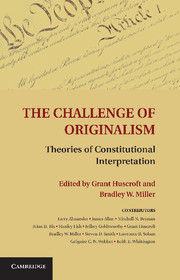Book contents
- Frontmatter
- Contents
- Preface
- Contributors
- The Challenge of Originalism: Theories of Constitutional Interpretation
- Part One Exposition and Defense
- Part Two Interpretation and Intention
- Part Three Originalism and Constitutional Settlement
- 7 Originalism’s Constitution
- 8 The Curious Concept of the “Living Tree” (or Non-Locked-In) Constitution
- 9 Vagueness, Finiteness, and the Limits of Interpretation and Construction
- Part Four Challenges and Critiques
- Index
- References
9 - Vagueness, Finiteness, and the Limits of Interpretation and Construction
from Part Three - Originalism and Constitutional Settlement
Published online by Cambridge University Press: 07 October 2011
- Frontmatter
- Contents
- Preface
- Contributors
- The Challenge of Originalism: Theories of Constitutional Interpretation
- Part One Exposition and Defense
- Part Two Interpretation and Intention
- Part Three Originalism and Constitutional Settlement
- 7 Originalism’s Constitution
- 8 The Curious Concept of the “Living Tree” (or Non-Locked-In) Constitution
- 9 Vagueness, Finiteness, and the Limits of Interpretation and Construction
- Part Four Challenges and Critiques
- Index
- References
Summary
Introduction
The most important questions that arise in judicial review under bills of rights typically involve the most vaguely worded rights. Rights to “equal protection” and “due process” in the U.S. Bill of Rights and to “equal protection and equal benefit of the law without discrimination” and “fundamental justice” in the Canadian Charter of Rights and Freedoms raise profoundly difficult moral and political questions, and the way in which they are interpreted by the courts has far-reaching consequences in the constitutional order. Given the stakes, concern about the legitimacy of particular approaches to constitutional interpretation is inevitable and it will not do to insist that “[i]t is emphatically the province and duty of the Judicial Department to say what the law is.” The question is not whether the judiciary must interpret the constitution but how it should do it.
“New” originalist theory addresses the challenge posed by vaguely worded rights by emphasizing a distinction between “interpretation” and “construction.” Interpretation is concerned with determining the linguistic meaning of the text of the bill of rights and is the first task for a court. Once meaning is ascertained the court turns to the task of construction, developing secondary rules or doctrines to flesh out the content of vaguely worded rights in order to resolve particular disputes.
- Type
- Chapter
- Information
- The Challenge of OriginalismTheories of Constitutional Interpretation, pp. 203 - 222Publisher: Cambridge University PressPrint publication year: 2011
References
- 1
- Cited by



